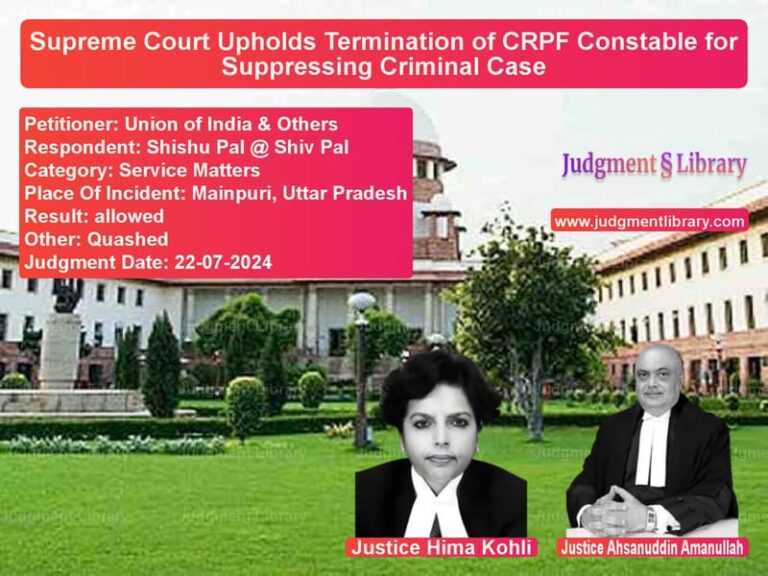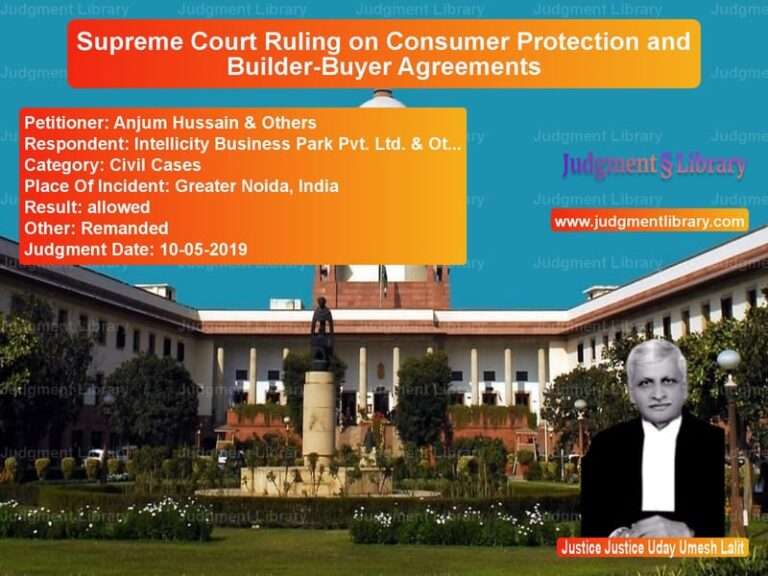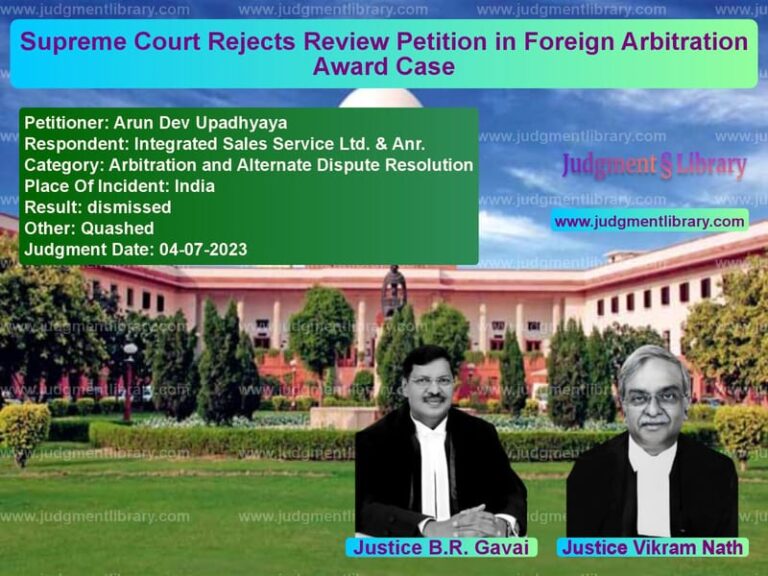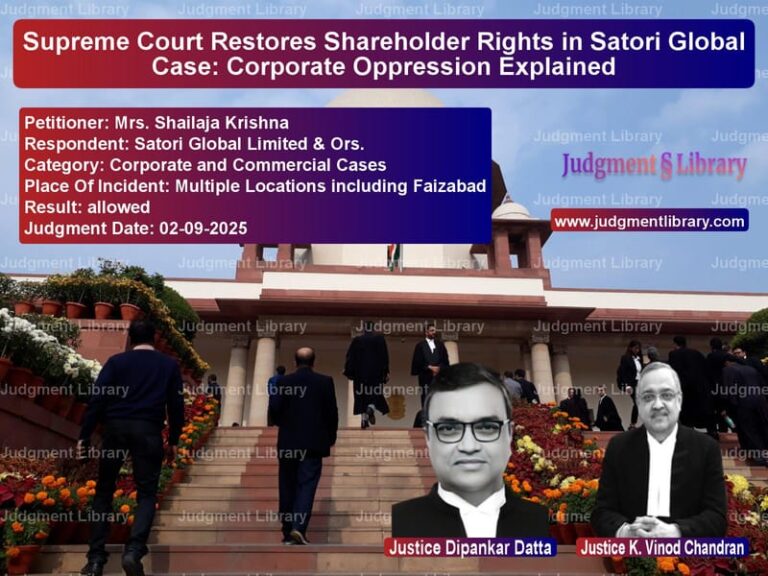Supreme Court Ruling on Lawyers’ Chamber Allotment: Eligibility and Residency Criteria Challenged
The Supreme Court of India recently ruled on a set of writ petitions concerning the allotment of lawyers’ chambers within the Supreme Court premises. The case involved a challenge to the eligibility criteria set by the Supreme Court’s administrative authorities for allocating chambers to practicing advocates. The judgment addressed key concerns regarding the block period for eligibility, the requirement of membership in the Supreme Court Bar Association (SCBA), and the restriction that only Delhi-based lawyers were eligible for chamber allotments.
Background of the Case
The petitions were filed by multiple advocates practicing before the Supreme Court, many of whom were members of either the SCBA or the Supreme Court Advocate-on-Record Association (SCAORA). The core issue pertained to the chamber allotment process, which was based on specific eligibility criteria, including:
- Membership in the SCBA.
- Practicing regularly before the Supreme Court.
- Having a specific number of filings or appearances within a designated block period.
- Being a resident of Delhi or New Delhi.
Some petitioners argued that these criteria were restrictive and unfairly excluded deserving advocates from accessing chambers within the Supreme Court premises.
Key Issues Raised
- Should the block period for eligibility be expanded beyond the existing range?
- Does the requirement of SCBA membership for chamber allotment violate constitutional principles?
- Should residency requirements be extended to include lawyers living in the National Capital Region (NCR)?
- Is it necessary to have a fixed, non-continuous process for chamber allotments?
Arguments of the Petitioners
- The petitioners contended that the block period (June 01, 2011 – June 30, 2016) was too restrictive. They suggested expanding it to cover a broader timeframe, such as from 2004 onward, to include more eligible candidates.
- They argued that the requirement for SCBA membership discriminated against advocates who were members of the SCAORA but not of the SCBA, even though both associations were recognized bodies within the Supreme Court.
- The petitioners challenged the residency requirement, asserting that many Supreme Court practitioners resided in the NCR (such as Noida, Gurgaon, and Ghaziabad) and should be considered eligible for chamber allotments.
- They also sought to make the application process for chamber allotments a continuous one, rather than one based on fixed windows that open only every few years.
Arguments of the Respondents
- The Supreme Court administration defended the existing eligibility criteria, arguing that a limited number of chambers necessitated strict guidelines.
- They asserted that membership in SCBA was necessary to maintain a structured and organized approach to chamber allotment.
- Residency in Delhi/New Delhi was justified on the grounds that chambers should be easily accessible to practicing advocates without long-distance commuting concerns.
- Making the chamber allotment process continuous would create administrative challenges and inconsistencies in maintaining the eligibility criteria.
Supreme Court’s Analysis
The Supreme Court carefully examined the issues raised in the petitions and provided the following clarifications and modifications:
- The block period for determining eligibility was modified from “June 01, 2011 – June 30, 2016” to “October 01, 2013 – September 30, 2018.” This change ensured that more recent practice records could be considered.
- The requirement for SCBA membership was upheld. The Court found that SCBA was an umbrella organization representing all advocates and that SCAORA membership alone did not suffice for chamber allotments.
- The Court acknowledged the concerns about the residency requirement and directed the Judges’ Allotment Committee to review whether NCR-based advocates should be considered eligible.
- The demand for making chamber allotments a continuous process was rejected. The Court held that periodic application windows (such as every three years) ensured fairness and proper administrative oversight.
Final Judgment
The Supreme Court ruled as follows:
- The block period for eligibility was revised to cover the years 2013–2018 instead of 2011–2016.
- The requirement that only SCBA members were eligible for chamber allotment was upheld.
- The Court referred the issue of expanding the residency requirement beyond Delhi to the Judges’ Allotment Committee for reconsideration.
- Chamber allotments will continue to be conducted periodically, rather than on a continuous rolling basis.
The judgment stated:
“We are of the opinion that having regard to the changed circumstances and the manner in which areas around Delhi have developed in past few years, many advocates who appear in courts in Delhi, including the Supreme Court, commute on a daily basis from their residences which fall in neighboring States. It is time to reconsider as to whether the requirement of residence in Delhi or New Delhi in Rule 3 of the Allotment Rules needs to be retained or it should be extended to some areas of neighboring States which are quite close to the vicinity of the Supreme Court.”
Implications of the Judgment
The Supreme Court’s ruling has significant implications for the chamber allotment process:
- Expanded Eligibility: The revised block period allows more advocates to apply for chambers based on recent practice.
- Confirmation of SCBA Membership Requirement: The Court affirmed that SCBA is the primary body responsible for chamber allocations.
- Potential Residency Expansion: The possibility of including NCR-based advocates could impact future chamber allotment policies.
- Structured Application Process: The Court’s ruling ensures that chamber allotments remain a periodic process rather than an open-ended application system.
The judgment balances administrative efficiency with the evolving needs of legal practitioners. It upholds established rules while allowing scope for potential future changes, particularly regarding residency criteria.
Petitioner Name: Gopal Jha & Others.Respondent Name: The Hon’ble Supreme Court of India.Judgment By: Justice A.K. Sikri, Justice Ashok Bhushan.Place Of Incident: New Delhi.Judgment Date: 25-10-2018.
Don’t miss out on the full details! Download the complete judgment in PDF format below and gain valuable insights instantly!
Download Judgment: Gopal Jha & Others vs The Hon’ble Supreme Supreme Court of India Judgment Dated 25-10-2018.pdf
Direct Downlaod Judgment: Direct downlaod this Judgment
See all petitions in Public Interest Litigation
See all petitions in Education Related Cases
See all petitions in Legal Malpractice
See all petitions in Judgment by A.K. Sikri
See all petitions in Judgment by Ashok Bhushan
See all petitions in partially allowed
See all petitions in Modified
See all petitions in supreme court of India judgments October 2018
See all petitions in 2018 judgments
See all posts in Civil Cases Category
See all allowed petitions in Civil Cases Category
See all Dismissed petitions in Civil Cases Category
See all partially allowed petitions in Civil Cases Category







